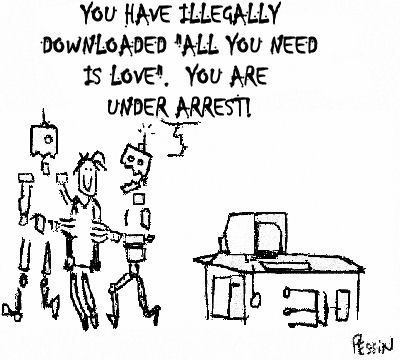Why are we concerned about the Big Brother Internet laws?

Translated from an old cartoon by Pessin from Le Monde
For years Australians have had their elections run by a commercial media over which they have less and less control. That media also decided what the public got to hear and what it didn't. With the invention of the Internet, although the commercial media is still very strong, for the first time in human history, everyone in the world who is not part of a totalitarian State, like China, Burma, Saudi Arabia or India, for instance, has the possibility of finding out real news, real politics, of creating politics, of reporting politics, and of championing truth and justice.
This web site (candobetter.org) exists to report politics and promote political ideas and actors who the mainstream press would never report - like the Greens raising concerns about population growth in Parliament, or how there are real reasons to worry that Australia's natural resources departments aren't doing their job to protect Australian animals.
We exist to expose where politics profit big business at the expense of democracy.
We exist because the editors and writers think this kind of website is essential. You may not like it, but at least you can have a look and choose not to come here again.
But, obviously a lot of what goes up on candobetter.org also gets up politicians' noses. These new proposals to have a secret list of 'undesirable' internet sites, which might have nothing to do with sex or crime, scare us.
The reason should be obvious. If a government can have a secret list of 'undesirable' netsites, we might be on it, yet no-one would ever know. We would have no defense and our readers would have no defense. It would be just like having nothing but the Murdoch, Fairfax and CNN media to rely on again.
And maybe something like that is behind this idea of Internet censorship. I would like to know who will benefit from this, especially since, apart from controlling access to media, the proposal seems almost certain to fail in its stated objectives of controlling crime, for technical reasons which Senator Ludlam begins to explore in Detailed Questions to Conroy on Government's Big Brother Internet proposal.
The Big Brother Internet proposal will probably fail in controlling crime, but it could make it easier for you and me to look at the sites government wants us to watch, and instill fear in us so that we won't stray away from those government-friendly big-business benefiting URLs. The old commercial media chains and the big telecommunications providers are dying to be able to 'offer' services where you and I will pay a certain amount to watch their choice of the internet, but, if we want to look somewhere else - and it could just be at internet in another language from another provider - we will have to pay extra and maybe our browsers just won't find what we want.
Having the Australian Government put the fear of ... um... God ... into us about casually surfing the net without a Big Provider's toolbar guiding our journey, could be all it takes to send Australia's much bossed-around "Mums and Dads" scurrying back to the Big Name providers, to avoid being arrested for inadvertantly opening one of those netsites on the Secret list.
Yes, the internet isn't just about truth and justice. It is also possible to use the Internet to communicate evil, to spy and to lie. Yes, it is possible to steal over the internet and it is possible to make money through marketing pornography resulting from sex-slavery, child-exploitation and terminal violence.
But the problem of pornography and exploitation doesn't explain why the Government wants to be able to peer over your shoulder, tell you what you may or may not view, and make your internet provider enforce this, or else.
We already can access Internet filters for children and adults.
We already have laws to deal with pornography. The police already have powers to investigate crimes. They can already seize material and take you away to prison if you are engaged in downloading child-pornography. So what is this "Mandatory Internet Filter" really for?
What you can do
Attend protests against Mandatory Internet Filtering in your capital city on Saturday 13 December. The following list has been provided by wearechange.org.au:
Melbourne: 12pm-5pm, State Library
Brisbane: 11am-3pm,Brisbane Square
Sydney: 11am-4pm, Town Hall
Check www.nocensorship.info forums for Sydney updates
Adelaide: 12pm - 4pm, Parliament
Hobart: 11am - 1.30pm, Parliament Lawns
Contact your Federal Parliamentary representatives and let them know where you stand on this issue. If they indicate that they will be voting against the legislations, give them your heartfelt congratulations. If they indicate that they intend to support censorship, then demand an explanation. In particular, demand answers to questions such as those put by Greens Senator Scott Ludlum.
Lists are to be found on the Parliamentary website:
Members of the House of Reps are listed by name, electorate, party and state.
Senators are listed by name, party and state.
http://www.getup.org.au/blogs/view.php?id=1560
Sign the GetUp on-line petition. So far, 74,304 have signed.
Participate in Online Forums such as on Getup Filtering at Odds with Broadband Revolution by Colin Jacobs
Online Opinion: Clive Hamilton the Net Nanny, Winning the war against Internet censorship, internet censorship.
Visit web-sites with current information about the campaign against Internet censorship including: www.stopthecleanfeed.com, wearechange.org.au, Electronic Frontiers Australia.

Recent comments